Key takeaways
- Meetup simplifies organizing playdates by providing a centralized platform for parents to connect and schedule events, reducing the stress of communication.
- Choosing the right group and event details ensures a positive experience for both children and parents, enhancing comfort and compatibility.
- Clear communication about event details and safety measures fosters trust and community among families, making playdates more enjoyable for everyone.
- Consistency in scheduling and flexibility in plans create a supportive environment, allowing families to build lasting connections through regular playdates.
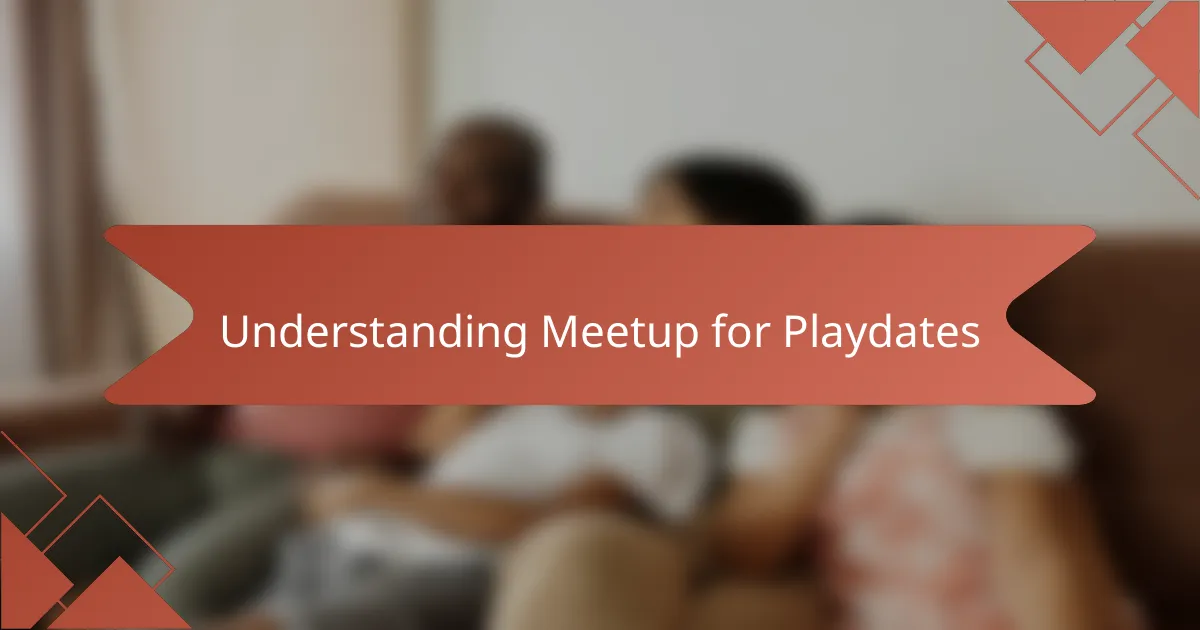
Understanding Meetup for Playdates
Meetup is more than just an app; it’s a community hub where parents like me have found a simple way to connect with others who share similar schedules and interests. I remember feeling overwhelmed trying to organize playdates with just texts and last-minute calls—Meetup changed all that by putting everything in one place.
What I’ve noticed is that Meetup takes the guesswork out of social planning. Have you ever wished you could just see a list of nearby playdates happening this week without endless back-and-forth? That’s exactly what this platform offers, making it easier to find the right groups and events that fit both kids’ needs and my own time constraints.
Using Meetup also brought an unexpected sense of comfort. Knowing there’s a community of parents who understand the chaos of juggling work, kids, and social lives makes me appreciate how much easier building friendships becomes. It’s like having a network of allies who want the same thing: happy, engaged kids and connected families.

Choosing the Right Meetup Group
Choosing the right Meetup group felt like searching for a tiny community gem among so many options. I quickly learned that focusing on groups whose values and schedules aligned with mine saved me from endless scrolling. Have you ever joined a group only to realize the timing or vibe just didn’t match your family’s rhythm? That mismatch creates more stress than joy.
What really helped was paying attention to the group’s description and past events. When I spotted a group emphasizing age-appropriate activities and flexible timings, I felt relieved. It’s one thing to find a playdate, but it’s another to find one where my kids could truly thrive and I could relax knowing the parents shared similar priorities.
I also trusted my instincts after reading member comments and seeing photos from past meetups. Sometimes, a group’s energy comes through in those little details, and that’s often the best predictor of whether your family will feel at home. Don’t we all want our kids to be excited about playdates—and ourselves to feel welcome? Choosing wisely makes all the difference.
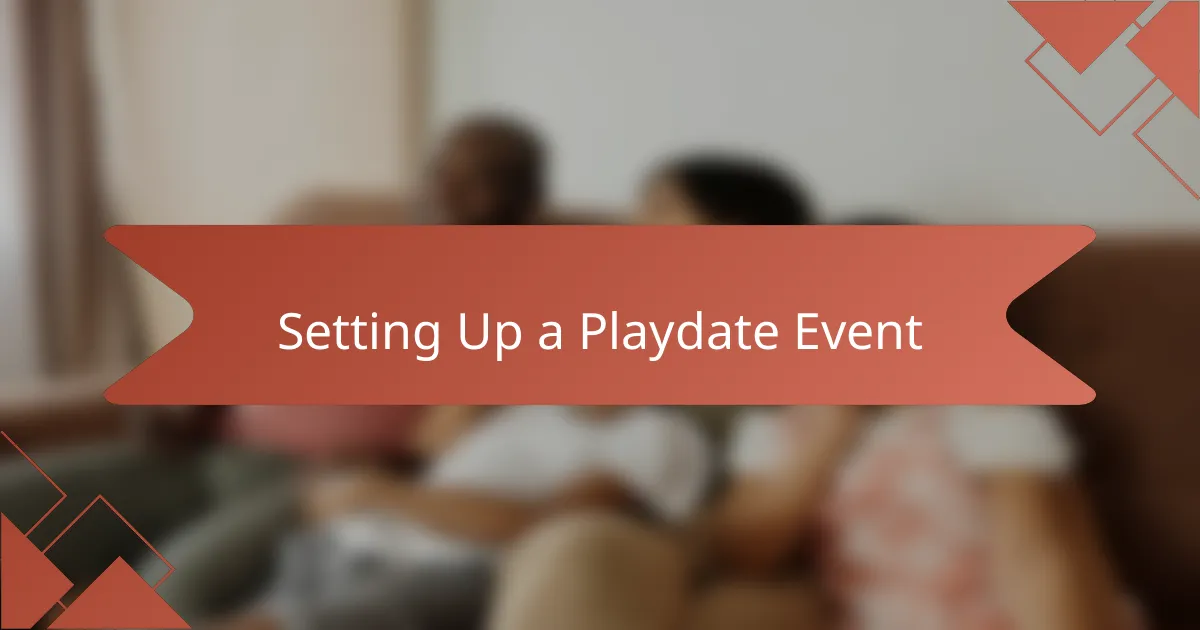
Setting Up a Playdate Event
Setting up a playdate event on Meetup was surprisingly straightforward once I got the hang of it. I started by pinpointing a convenient date and location, thinking about what works best for both the kids and the parents. Have you ever tried to coordinate a time only to realize everyone’s schedule is different? That part can be tricky, but Meetup’s scheduling tool really helped minimize that back-and-forth.
Next came crafting the event description—a moment I found oddly important. I wanted to capture the vibe and make it welcoming but clear about what families could expect. Sharing a little about the activities planned and the intended age group felt like setting the right tone, almost like inviting friends over rather than just posting an event online.
Finally, I invited a few parents from the group I’d joined, hoping the event would feel natural and informal. Seeing RSVPs trickle in created this little buzz of excitement for me, knowing our kids would have new playmates to meet. Have you noticed how sharing the details early helps everyone feel prepared and less anxious? That’s been my experience every time I set a playdate through Meetup.
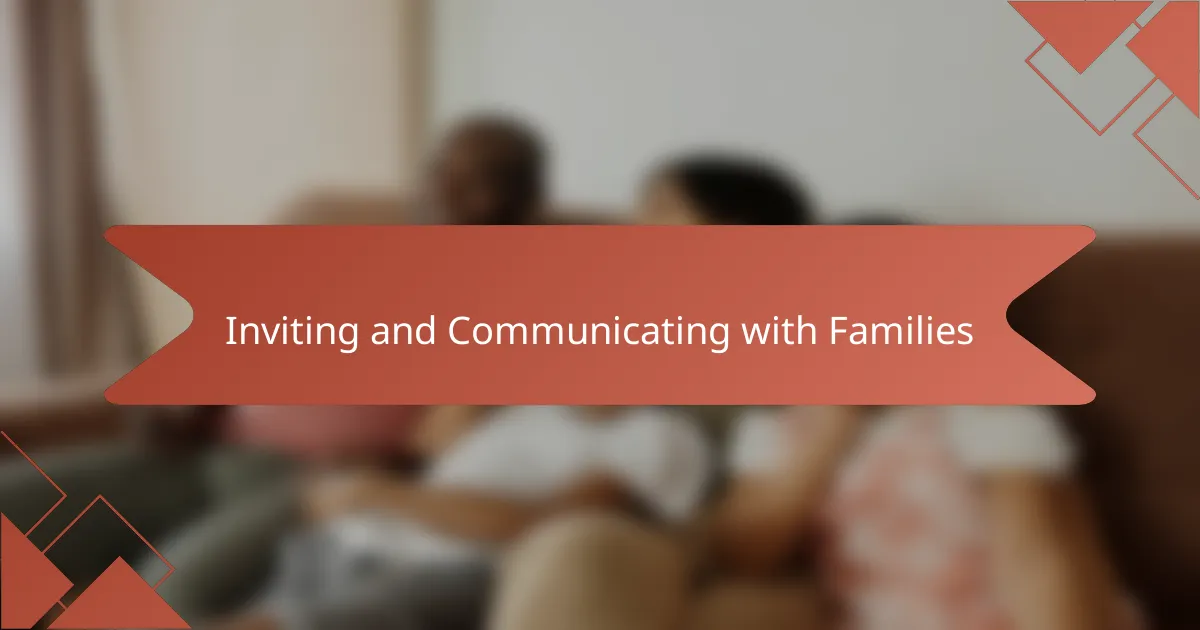
Inviting and Communicating with Families
Inviting families through Meetup felt more personal than I expected. Instead of cold messages, I wrote casual, warm invites that shared a bit about our family and the fun planned. Have you ever noticed how a simple “hope to see you there” makes an invitation feel friendlier? That small touch seemed to encourage more parents to respond and join in.
When communicating, I found being clear and upfront about details saved a lot of confusion later. Sharing the time, place, and activity helped everyone show up prepared and relaxed. I also made it a point to respond quickly to questions or concerns—after all, organizing playdates involves families juggling busy lives, just like mine.
One thing I learned is that keeping the tone light and inclusive invites trust right from the start. I’d often ask parents what worked best for them and their kids, which made them feel valued and listened to. Isn’t it amazing how open communication can turn strangers into a supportive community? That’s the magic I loved about using Meetup for playdates.
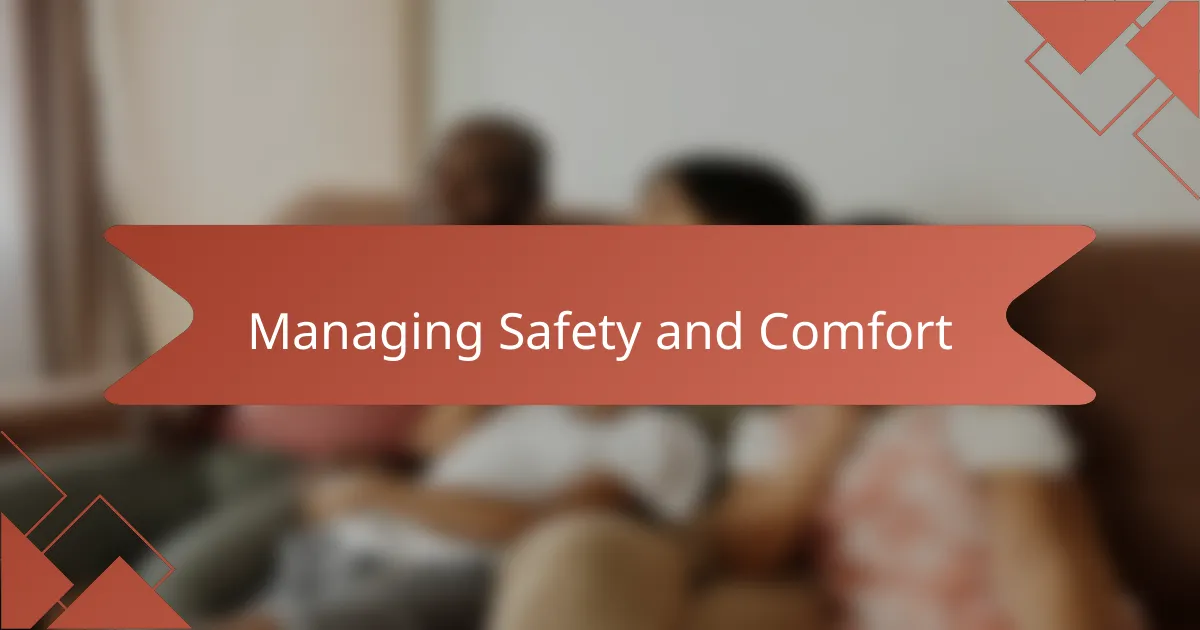
Managing Safety and Comfort
Managing safety and comfort became my top priority when organizing playdates through Meetup. I made sure to choose familiar, child-friendly locations where I could easily keep an eye on all the kids. Have you ever felt uneasy leaving your little ones somewhere unfamiliar? That feeling motivated me to opt for places with clear boundaries and easy access.
I also set some basic ground rules in the event description—like informing parents about allergies or any special needs upfront. This small step helped me create an environment where everyone felt respected and secure without awkward surprises. Isn’t it reassuring when you know that the other parents care just as much about your child’s wellbeing?
Another thing I found invaluable was encouraging parents to stay engaged throughout the playdate. I noticed that when adults were nearby, the kids played more freely and confidently. Plus, chatting casually with other parents eased any lingering worries I had. From my experience, this balance of vigilance and relaxation makes all the difference in managing safety while keeping the mood light and fun.
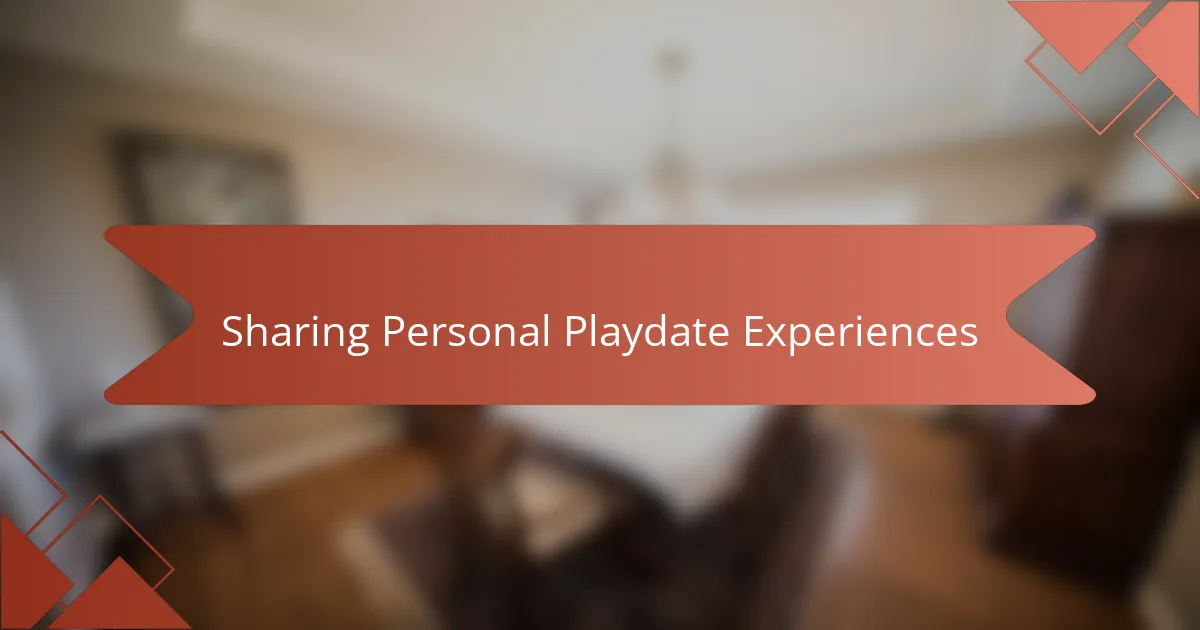
Sharing Personal Playdate Experiences
One of the most rewarding parts of organizing playdates via Meetup has been hearing the little stories parents share afterward. I remember one mom telling me how her shy kid suddenly found a friend after just one meetup—moments like that make the effort feel truly worthwhile. Have you ever experienced that joyful surprise when your child comes home buzzing about a new buddy?
Sometimes, the feedback is just as valuable for me as a host. After a few playdates, parents shared tips on what worked best and which activities sparked the most giggles. That kind of open exchange helped me fine-tune future events, making each get-together more enjoyable for everyone involved. Don’t you find that learning directly from other parents feels more trustworthy and practical than any generic advice?
What I appreciate most is how these shared experiences build a sense of community. When parents exchange stories—whether it’s about diaper dilemmas, snack preferences, or wild imaginations—it creates a bond beyond the playdate itself. It reminds me that we’re all navigating this parenting journey together, which makes those little triumphs and challenges feel less lonely. Have you noticed how these connections shift playdates from just “events” into something much more meaningful?
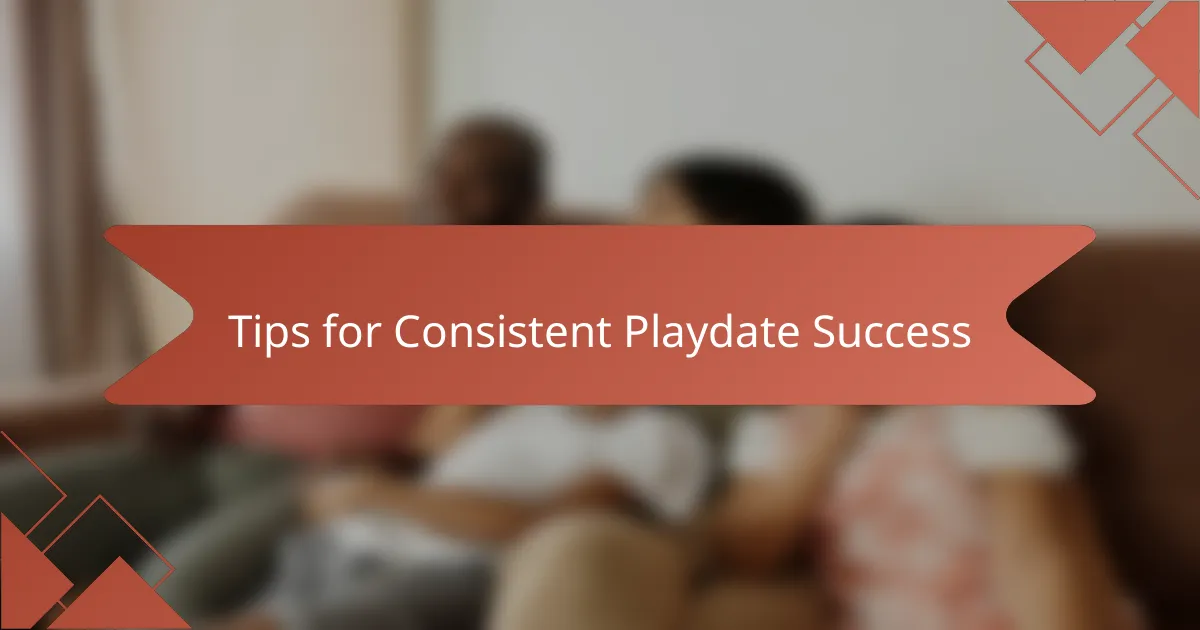
Tips for Consistent Playdate Success
Consistency really hinges on setting a rhythm that fits your family’s unique flow. From my experience, choosing a regular day or time—like every other Saturday morning—takes so much of the stress out of scheduling. Have you ever felt relief just knowing there’s a playdate to look forward to without hunting down busy parents each week?
Clear communication is another game-changer. I found that sending gentle reminders a day or two before the playdate helped everyone stay on track. It’s amazing how a simple message can ease any last-minute doubts, turning potential no-shows into excited “yes” replies.
Lastly, staying flexible has saved me countless times. Kids get sick, plans shift, and sometimes you need to pivot, and that’s okay. What keeps things running smoothly is the understanding that playdates are about connection, not perfection—and that mindset makes all the difference.